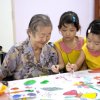IT is a crying shame that the only residential facility in the Klang Valley dedicated to the care of the elderly with dementia will be closing its doors by the end of August due to financial constraints and difficulty in recruiting qualified staff.
People with dementia, in particular Alzheimer’s Disease (AD), which is the most common form of dementia, require special care and supervision that can only be provided by trained staff.
Unfortunately, very few of our nursing schools offer courses in geriatric care.
The demand for nurses with such qualifications is set to soar as the population ages. By 2035, 15% of our population will be aged 60 and above. The number of people with dementia is expected to rise in tandem from 123,000 in 2015 to 261,000 in 2030 and to 590,000 in 2050. The data comes from ADI 10/66 Dementia Research Group, which is part of Alzheimer’s Disease International.
These are alarming figures. It is worrying that most homes for the elderly do not make a distinction between the elderly with dementia and those that do not have the disease. Both are housed under the same roof, and given the same general care.
That is why Dementia Homecare Centre in Teluk Panglima Garang is the model for other homes to emulate, and should therefore be given the assistance it urgently needs to continue its good work.
The centre was set up in 2011 to provide 24/7 care for those with AD. For many families, the centre was an answer to their prayers.
Finally, here was a place set amidst pleasant quiet surroundings where they could send their elderly relatives and be assured that they would be well cared for.
The centre has a qualified nurse manager and trained staff to look after the residents. The staff-patient ratio is kept low for better care management. There is a daily programme of activities to keep the residents mentally and physically engaged.
Besides an executive committee, the homecare centre also has a Board of Trustees as well as an Advisory Panel of Medical Specialists that includes geriatricians.
It would be hard to find another care centre for the elderly that comes close to Dementia Homecare Centre in terms of facilities, care and management.
The past two years have been a struggle for the centre as it is unable to fill vacancies for trained staff. There is also a lack of promotion for the centre. While the demand is there, not many people know that such a facility exists in Selangor.
To alleviate the centre’s current problems, one solution is for the Government to step in and allow the centre to recruit foreign nurses qualified in geriatric care to work at the centre. This would mean issuing work permits to these nurses.
A second option is to turn the centre into a training institute for nurses and doctors specialising in geriatric care, or as a model of how a residential dementia facility should be run.
A third option is for an aged care company or organisation to take over the centre and run it as the country’s premier dementia residential care centre.
It would truly be a huge loss if this dementia homecare centre were to close its doors permanently.
Source: The Star
Geriatric Centre Needs Help

